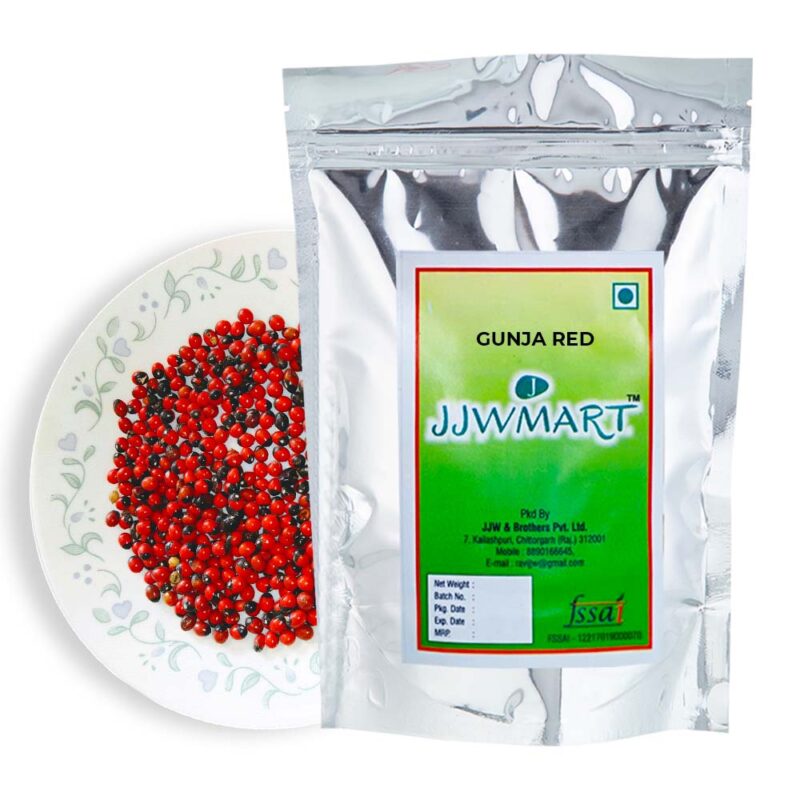Ayurvedic products and herbs
Abrus Precatorius Rosary Pea Benefits
Explore the benefits of Abrus Precatorius, also known as Rosary Pea. Learn how this unique plant supports skin health, digestion, and immunity, while ensuring safe use. Curious to know more? Find out here!
Contents
What is Abrus Precatorius (Rosary Pea)?
Abrus Precatorius, commonly known as Rosary Pea or Ratti, is a striking plant native to tropical regions, particularly in India and parts of Africa. With its vibrant red seeds adorned with black spots, it’s not just visually appealing but also rich in cultural significance. Traditionally, it has been used in jewelry and as a talisman, symbolizing protection and faith. However, beyond its aesthetic charm, the abrus precatorius plant boasts a range of health benefits that have captured the interest of herbalists and researchers alike.
Historical Uses of Abrus Precatorius
Historically, Abrus Precatorius has been utilized in various traditional medicine systems, including Ayurveda and Siddha. Ancient texts reveal its application in treating ailments such as coughs, skin diseases, and even as a purgative. The seeds, despite their toxicity, have been processed in specific ways to harness their medicinal properties. In some cultures, the plant is also associated with rituals and folklore, further embedding it into the cultural fabric of the regions where it grows.
Key Health Benefits of Rosary Pea
The Rosary Pea is more than just a pretty seed; it is packed with potential health benefits. Here are some key advantages:
- Anti-inflammatory Properties: Extracts from the leaves and seeds have shown promise in reducing inflammation, making them beneficial for conditions like arthritis.
- Antimicrobial Effects: Studies indicate that Abrus Precatorius exhibits antibacterial and antifungal properties, which can help in treating infections.
- Digestive Health: Traditionally, the plant has been used to alleviate digestive issues, promoting overall gut health.
Abrus Precatorius in Traditional Medicine
In traditional medicine, particularly Ayurveda, Abrus Precatorius is revered for its diverse therapeutic applications. It’s often used to treat:
- Skin Conditions: The leaves can be applied topically to manage acne and other skin irritations.
- Respiratory Issues: Decoctions made from the leaves are consumed to relieve coughs and colds.
- Digestive Disorders: The plant is known to aid in digestion and is sometimes used to treat diarrhea.
Nutritional Profile of Rosary Pea
While the seeds are toxic and should be processed carefully, the abrus precatorius plant offers some nutritional benefits. The leaves are rich in:
- Vitamins: They contain essential vitamins that support overall health.
- Minerals: Nutrients like calcium and iron are present, contributing to bone health and preventing anemia.
- Antioxidants: The plant is known for its antioxidant properties, which combat oxidative stress in the body.
Potential Therapeutic Uses of Abrus Precatorius
Research into the therapeutic potential of Abrus Precatorius is ongoing. Some areas of interest include:
- Pain Relief: Its analgesic properties may help in managing chronic pain.
- Antidiabetic Effects: Some studies suggest that the plant may help regulate blood sugar levels, making it beneficial for diabetics.
- Cancer Research: Preliminary studies indicate that compounds in the plant could have anti-tumor effects, although more research is needed.
Rosary Pea: A Natural Remedy for Skin Conditions
One of the standout Abrus Precatorius Rosary Pea benefits is its application in skincare. The leaves can be ground into a paste and applied to the skin to treat various conditions, including:
- Acne: The antimicrobial properties help reduce acne-causing bacteria.
- Wounds and Sores: Its anti-inflammatory effects can promote healing and reduce scarring.
- Eczema: The soothing properties of the leaves may alleviate itching and inflammation associated with eczema.
How Abrus Precatorius Supports Digestive Health
Digestive health is another area where Abrus Precatorius shines. Traditionally used to treat digestive disorders, it may help with:
- Bloating and Gas: The plant can aid in reducing bloating and promoting regular bowel movements.
- Diarrhea: Its astringent properties may help in managing diarrhea when prepared correctly.
- Overall Gut Health: The nutrients in the leaves support a healthy gut microbiome.
Boosting Immunity with Rosary Pea
Another significant benefit of Abrus Precatorius is its potential to boost immunity. The antioxidants present in the plant help combat free radicals, enhancing the body’s defense mechanisms against infections and diseases. Regular consumption, in a safe and processed form, may contribute to overall health and resilience.
How to Use Rosary Pea Safely
To enjoy the benefits of Abrus Precatorius without the risks, consider the following guidelines:
- Processing Seeds: Always heat-treat the seeds to denature the toxins before consumption. Boiling them in milk is a traditional method.
- Use Leaves for Topical Applications: The leaves can be safely used in pastes for skin conditions.
- Consult Experts: Always seek advice from herbalists or healthcare providers familiar with the plant.
Rosary Pea Seeds for Sale: Buy Now
Conclusion
Abrus Precatorius, or Rosary Pea, is a fascinating plant with a rich history and a plethora of health benefits. From its traditional uses in medicine to its potential in modern therapeutic applications, this plant holds a unique place in both cultural and health contexts.
However, it’s crucial to approach it with respect and caution due to its toxic properties. By understanding how to use it safely, you can harness the many Abrus precatorius (Rosary Pea) benefits while minimizing risks.


